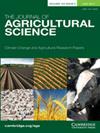灌溉农业作为应对气候变化的适应策略综述
IF 1.7
4区 农林科学
Q2 AGRICULTURE, MULTIDISCIPLINARY
引用次数: 0
摘要
农业的发展提高了作物产量,减少了鼠疫的影响。作为农业和工业化人类足迹的负面结果,总体经济实践导致了环境的重大变化(即温室气体产生、大气温度升高、更极端的气候事件),统称为气候变化。气候变化导致的环境快速变化在热带地区最为常见,这一现象的影响在世界上大多数农业活动发生的不同地区都能感受到。这些事实加强了减少气候变化产生活动和实施适应性做法以提高长期农业生产力和可持续性的必要性。尽管听起来可能有悖常理,但农业生态系统和传统知识可能为减轻气候变化对农业的影响提供替代方案。本文全面介绍了灌溉农业的发展、气候变化对灌溉的主要影响,并进一步探讨了源于农业生态系统或传统知识的替代实践,这些实践可以提高农业生产力和可持续性。提出了建立气候风险规划,农业生产者必须调整其投入物的应用,以适应新的水和热需求;实施保护技术以减少土壤水分的流失,从而确保作物在气候变化预测所指出的更干燥和更温暖的环境中生长。同样,实施耐水胁迫品种是另一项适应行动,可以在较低地区继续种植,这些地区集中了最大的灌溉面积,受到温度升高的影响最大。这样,就有必要实施新的方法、技术和政策,以吸取过去的经验,遵循新的气候情景,保护和合理利用自然资源。本文章由计算机程序翻译,如有差异,请以英文原文为准。
Irrigated Agriculture as an Adaptation Strategy Against Climate Change: A Review
Agriculture evolved to increase crop productivity and diminish plague effects. As a negative outcome of the human footprint by agriculture and industrialization, overall economic practices have led to substantial alterations in the environment (i.e., greenhouse gas production, elevated atmospheric temperature, more extreme climatic events), collectively known as climate change. The fast-changing environment due to climate change is most common in the tropics, the impacts of this phenomenon are perceived in different regions of the world, where most agricultural activity occurs. These facts reinforce the requirement for diminishing climate change producing activities and implementation of adaptive practices for long-term agricultural productivity and sustainability. Albeit may sound counter-intuitive, agroecological systems and traditional knowledge may provide alternatives to mitigate climate change effects in the context of agriculture. This review comprehensively describes the development of irrigated agriculture, major effects of climate change on irrigation, and further explores alternative practices stemming from agroecological systems or traditional knowledge, which could improve agricultural productivity and sustainability. Among some strategies, it is proposed to establish climate risk planning, agricultural producers must modify the application of their inputs to adjust to the new water and thermal requirements; implement conservation techniques to reduce the loss of soil moisture and thus ensure the development of crops in a drier and warmer environment as indicated by climate change projections. Likewise, the implementation of varieties tolerant to water stress is one more adaptation action that would allow continuing cultivating in lower regions, where the largest irrigated area is concentrated and which would receive the greatest impact from an increase in temperature. In this way, it will be necessary to implement new approaches, technologies and policies to learn from the past, following the new climate scenarios, conserving and making rational use of natural resources.
求助全文
通过发布文献求助,成功后即可免费获取论文全文。
去求助
来源期刊

Journal of Agricultural Science
农林科学-农业综合
CiteScore
2.80
自引率
5.00%
发文量
68
审稿时长
1.4 months
期刊介绍:
The Journal of Agricultural Science publishes papers concerned with the advance of agriculture and the use of land resources throughout the world. It publishes original scientific work related to strategic and applied studies in all aspects of agricultural science and exploited species, as well as reviews of scientific topics of current agricultural relevance. Specific topics of interest include (but are not confined to): all aspects of crop and animal physiology, modelling of crop and animal systems, the scientific underpinning of agronomy and husbandry, animal welfare and behaviour, soil science, plant and animal product quality, plant and animal nutrition, engineering solutions, decision support systems, land use, environmental impacts of agriculture and forestry, impacts of climate change, rural biodiversity, experimental design and statistical analysis, and the application of new analytical and study methods (including genetic diversity and molecular biology approaches). The journal also publishes book reviews and letters. Occasional themed issues are published which have recently included centenary reviews, wheat papers and modelling animal systems.
 求助内容:
求助内容: 应助结果提醒方式:
应助结果提醒方式:


